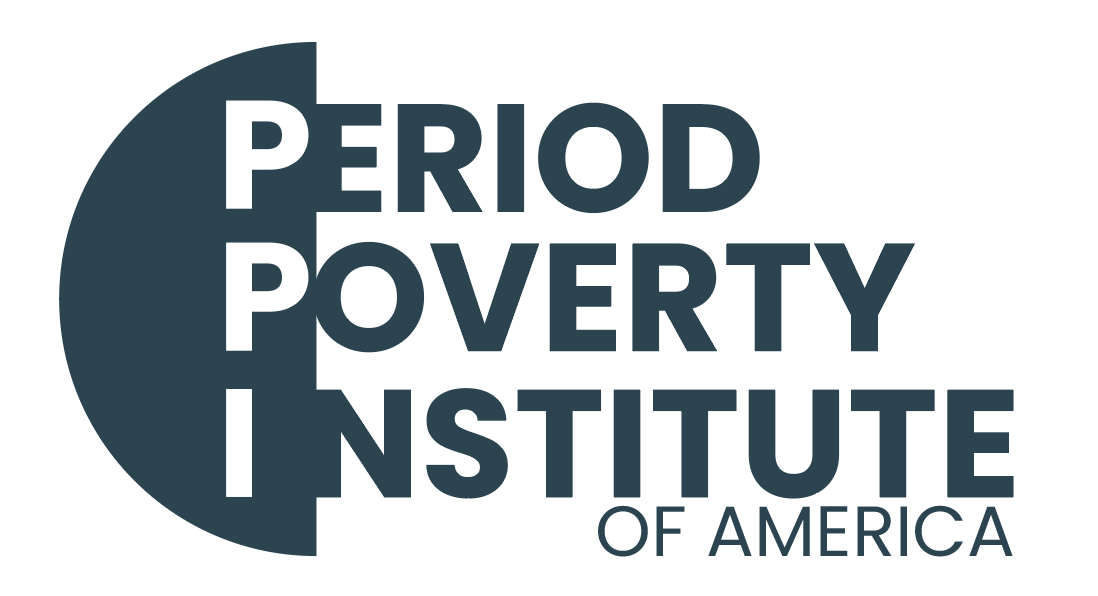Period Poverty Institute of America
championing data-driven systemic change to eliminate obstacles and combat the public health issue of Period Poverty
The Period Poverty Institute of America is at the forefront of addressing an often underrepresented critical public health crisis that affects millions across the nation.
Period Poverty is a Public Health Crisis
Period Poverty, the lack of or uncertain access to menstrual hygiene products due to financial constraints, disproportionately impacts low-income individuals, posing severe barriers to health, education, and overall well-being.
Without the necessary resources to manage menstruation with dignity, those affected may experience significant disruptions to their daily lives, including missing school or work, facing social stigma, and enduring health complications. The Institute aims to eradicate these barriers by advocating for systemic change and providing essential support to those in need.
GLOSSARY
Period Poverty
Lack of or uncertain access to menstrual hygiene products due to financial constraints
Menstruation / Menstrual Period
The monthly shedding of blood and tissue from the lining of the uterus, when pregnancy does not occur
Menstrual Hygiene
Maintaining health and cleanliness of the body during a menstrual period. Appropriate products (including sanitary pads, tampons, and menstrual cups) used
Menstrual Equity
Fair and complete access to menstrual hygiene products for all individuals who need them
Hygiene Desert
Lack of affordable hygiene products among a community’s retailers; the unintentional result of product drives and the reason premier charitable organizations operate through monetary donations rather than product donations
Data-Driven Systemic Change
Efforts to reverse the growing prevalence of Period Poverty, informed by current and unbiased research
Social policy
Principles that guide a society in managing social welfare, equality, and justice, shaped by cultural values, political ideologies, and economic conditions
Our approach
UNBIASED DATA COLLECTION & ANALYSIS
Unbiased data collection and analysis are fundamental to understanding and ultimately eliminating Period Poverty in the United States. Accurate statistics help identify the scope and scale of the issue, uncovering the demographics most affected and the specific challenges faced. This information is indispensable for crafting effective policies and targeted interventions. Moreover, unbiased data that distinguishes between Period Poverty and typical menstruation experiences ensures that the narrative around Period Poverty is based on factual evidence rather than misconceptions or stigmas. It empowers stakeholders to make informed decisions, allocate resources efficiently, and measure the impact of their efforts.
HOLISTIC, DATA-DRIVEN CHANGE
To end Period Poverty, the Institute emphasizes the importance of focusing on the lived experiences of affected individuals, households, communities, and populations in its approach. Ensuring that all have access to menstrual hygiene products is not merely about meeting a physical need; it is about restoring and upholding their one’s dignity. The Institute’s initiatives recognize menstrual hygiene as a fundamental human right and a non-canonical social determinant of health. By fostering an environment of holistic, data-driven change the Institute seeks to end Period Poverty in the United States.
Period Poverty In America report
Period Poverty in America
Published: 10.16.2023
By: Dignity Grows
A groundbreaking, comprehensive look into the prevalence of Period Poverty in the USA and its impacts on individuals, households, and communities.
Cite Report:
press & news
Press Release: When Poverty Isn’t “Poverty”
HARTFORD, Conn., Sept. 25, 2024 /PRNewswire/ -- While the US Census Bureau determined that in 2023, 11.1% of Americans lived within the commonly accepted definition of "poverty," another heart-wrenching statistic went largely unnoticed: During that...
ReSOURCE CENTER
From Generation to Generation
Generational poverties - like Period Poverty - perpetuate cycles of economic inequality, limiting opportunities for upward mobility. Chronic poverty can result in a lack of financial literacy passed down from parents to children, hindering economic...
The True Cost of Period Poverty
Period Poverty impacts individuals' economic prospects and has wider implications for society as a whole. Reduced Workforce Participation: Without routine access to menstrual hygiene products, women are often forced to miss work, limiting...
Hygiene & Homelessness
While good personal hygiene is well known to reduce risk of infectious disease and improve mental health, access to hygiene products and behaviors among people experiencing homelessness in the United States generally receives little attention. When...
Financial Abuse and Period Poverty
Financial abuse is a common form of domestic violence. A financial abuser will take control of all household resources, limiting or cutting off the victim’s access to assets. Financial abuse can perpetuate Period Poverty. Menstrual hygiene items...
Menstruation & the Brain
For the first time, scientists are observing structural, brain-wide changes related to menstruation. A woman’s brain may change slightly every month, which is directly connected to her menstrual cycles. It is believed both the gray and white matter...
The Power of the Pad: Period Poverty & Human Trafficking
For thousands of American girls, access to monthly period products means uninterrupted attendance at school. This can have lasting impacts on far more than just their education. School provides a safe, protected space, particularly for children...
Heading To Campus In The Era Of Period Poverty
For many recent high school graduates, starting life on a 2 or 4 year college campus can bring unexpected financial challenges, including Period Poverty. College may be the first time a young adult is responsible for their own finances and it is...
American girls are menstruating earlier and earlier. What does that mean for Period Poverty?
The average age at menarche has been decreasing among younger generations in the US, especially among racial minorities and lower socioeconomic statuses. A new study shows that girls born between 2000 and 2005 started their periods at an average...
The Health Consequences of Period Poverty
Without access to appropriate and adequate period products, millions of American women and girls face serious - and potentially fatal - medical implications. Women who cannot afford menstrual hygiene items often resort to using makeshift options,...
Period Poverty & Education
Period Poverty has a hidden yet profound influence on education, affecting various aspects of a student’s experience in subtle but impactful ways. Routine lack of access to period products can lead to chronic absenteeism, causing significant...
